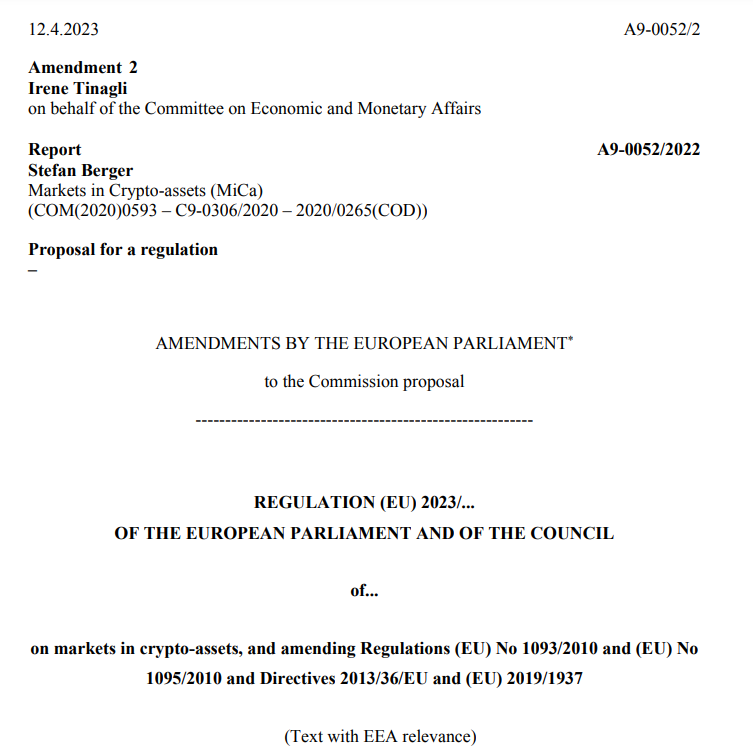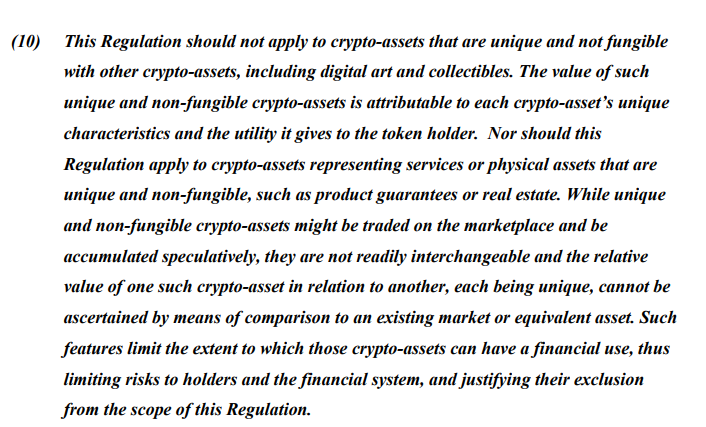The final #MiCA text is here!
After a false alarm on Thursday, when pre-trilogue amendments were mistaken for a new version, we can now take a look at the text that will be voted on by the @Europarl_EN on 20/4
TL;DR - No changes for DeFi, NFTs & stablecoins' caps
A quick 🧵
After a false alarm on Thursday, when pre-trilogue amendments were mistaken for a new version, we can now take a look at the text that will be voted on by the @Europarl_EN on 20/4
TL;DR - No changes for DeFi, NFTs & stablecoins' caps
A quick 🧵

MiCA will NOT apply to "crypto-asset services provided in a fully decentralised manner without any intermediary"
The @EU_Commission will produce a report in 18 months assessing the "necessity and feasibility of regulating #DeFi"

The @EU_Commission will produce a report in 18 months assessing the "necessity and feasibility of regulating #DeFi"


It will also NOT apply to unique and non-fungible tokens, but it WILL apply to fractional #NFTs
Authorities to adopt a "substance over form approach" when classifying NFTs, as their "de facto features" or their "issuance in a large series" could mean they are fungible = captured

Authorities to adopt a "substance over form approach" when classifying NFTs, as their "de facto features" or their "issuance in a large series" could mean they are fungible = captured


Issuers of ARTs & EMTs-pegged to a non-EU currency need to stop issuing their #stablecoins if these become too widely used as means of exchange
Stablecoins used for crypto trading would NOT be counted, unless they are used for settlement of transactions in other crypto-assets

Stablecoins used for crypto trading would NOT be counted, unless they are used for settlement of transactions in other crypto-assets


Crypto providers from outside the EU need to comply with the rules only if they solicit clients in the EU, regardless of the means of communication used or any contractual disclaimers
@ESMAComms to provide guidelines on #reversesolicitation in 18 months
@ESMAComms to provide guidelines on #reversesolicitation in 18 months

As shown in the plenary agenda, the @Europarl_EN will hold a joint-debate on both #MiCA and #TFR (aka the @FATFWatch 'travel rule') on 19/4
They will then vote on both texts (separately) on 20/4
What a week we have ahead of us 😍
They will then vote on both texts (separately) on 20/4
What a week we have ahead of us 😍

2.5 years since the original proposal by the @EU_Commission, we are excited for the imminent end of this long legislative process
While some open questions need to be answered by the "Level 2" legislation, MiCA will be a great first step for the EU to take the lead on #Web3 🚀
While some open questions need to be answered by the "Level 2" legislation, MiCA will be a great first step for the EU to take the lead on #Web3 🚀
The full #MiCA text that will be debated and voted on next week is available here
europarl.europa.eu/doceo/document…
europarl.europa.eu/doceo/document…
• • •
Missing some Tweet in this thread? You can try to
force a refresh




